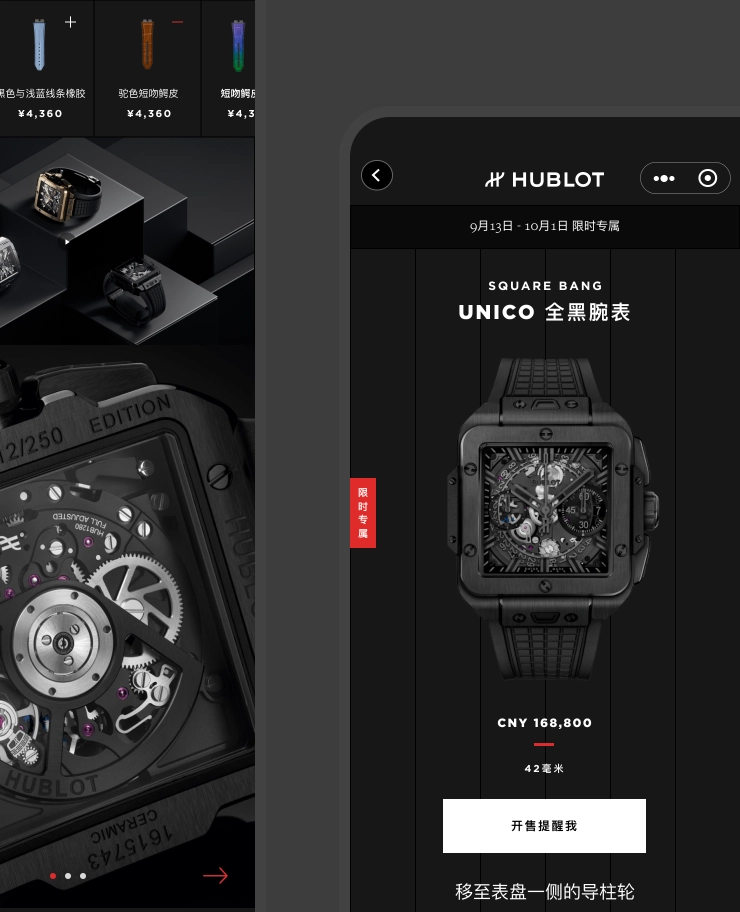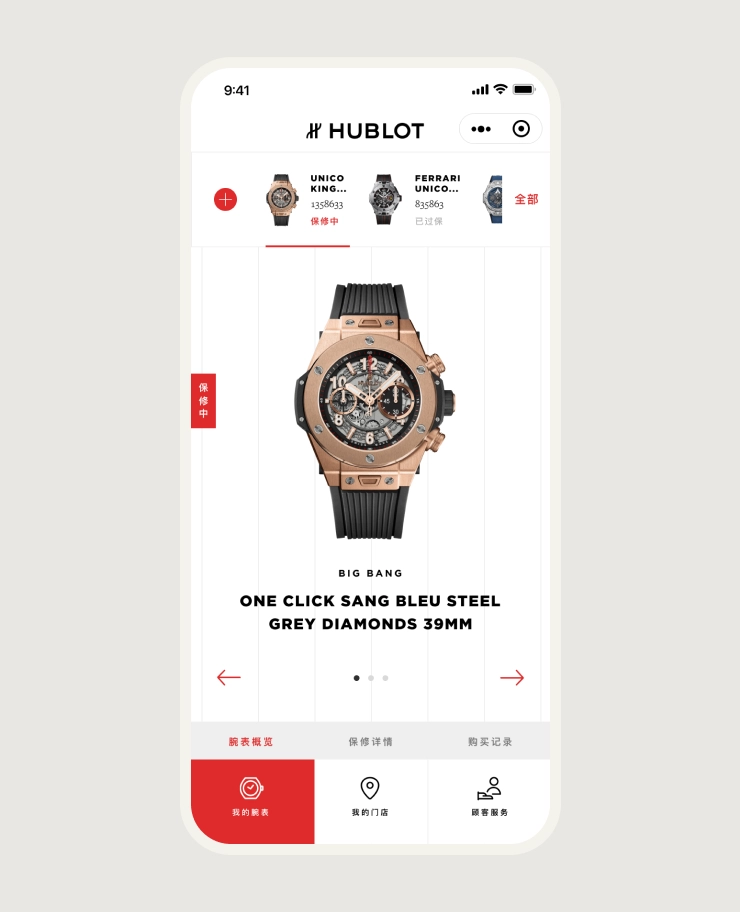The Mini Program Multiverse: Explore China's Super App Ecosystems
December 1st, 2025 · Written by Samuel Jesse

Contents
In China, mini programs have emerged as a revolutionary concept transforming how users interact with applications and services. These lightweight sub-applications, operating within larger "super apps," offer a seamless and convenient way for users to access a wide range of functionalities without the need for downloading and installing separate native apps.
At the forefront of this mini program revolution are China's leading technology giants, such as Tencent, Alibaba, and Baidu. They have introduced comprehensive mini program ecosystems within their respective super app platforms. These ecosystems have become thriving marketplaces for businesses across various industries, enabling them to reach vast user bases and provide enhanced experiences directly within the apps that users already have integrated into their daily lives.
In this article we will delve into the world of mini programs in China, exploring the unique offerings and ecosystems of major players like WeChat, Alipay, Douyin, Baidu, Xiaohongshu (RED), Taobao, and others. From understanding the capabilities and functionalities of these mini program ecosystems to examining their potential impact on businesses and user experiences, this article aims to provide a comprehensive overview of this rapidly evolving sector.
Major Super Apps and Their Mini Program Ecosystems
WeChat Mini Programs
When it comes to mini-programs, WeChat's ecosystem is often the first that comes to mind. WeChat, developed by Tencent, was the first super app to introduce mini-programs in early 2017. As of third quarter of 2025, the Chinese multi-functional social media platform had over 1.41 billion monthly active users, according to Statista.
WeChat mini-programs can be accessed through various entry points within the app, such as sliding down on the chat page, scanning QR codes, or accessing them from mini-program posts in chats and advertisements on the Discover page.
While e-commerce is a significant part of the WeChat mini program ecosystem, its true strength lies in its versatility and ability to accommodate a wide range of use cases beyond buying and selling products.
One notable example is the LOEWE Crafted World exhibition mini program, which serves as an offline event companion during the brand's exhibition in Shanghai in the spring of 2024. This mini program allowed visitors to book tickets, access an interactive exhibition map, explore digital experiences, and even engage with a fun mini-game, enhancing the overall event experience.
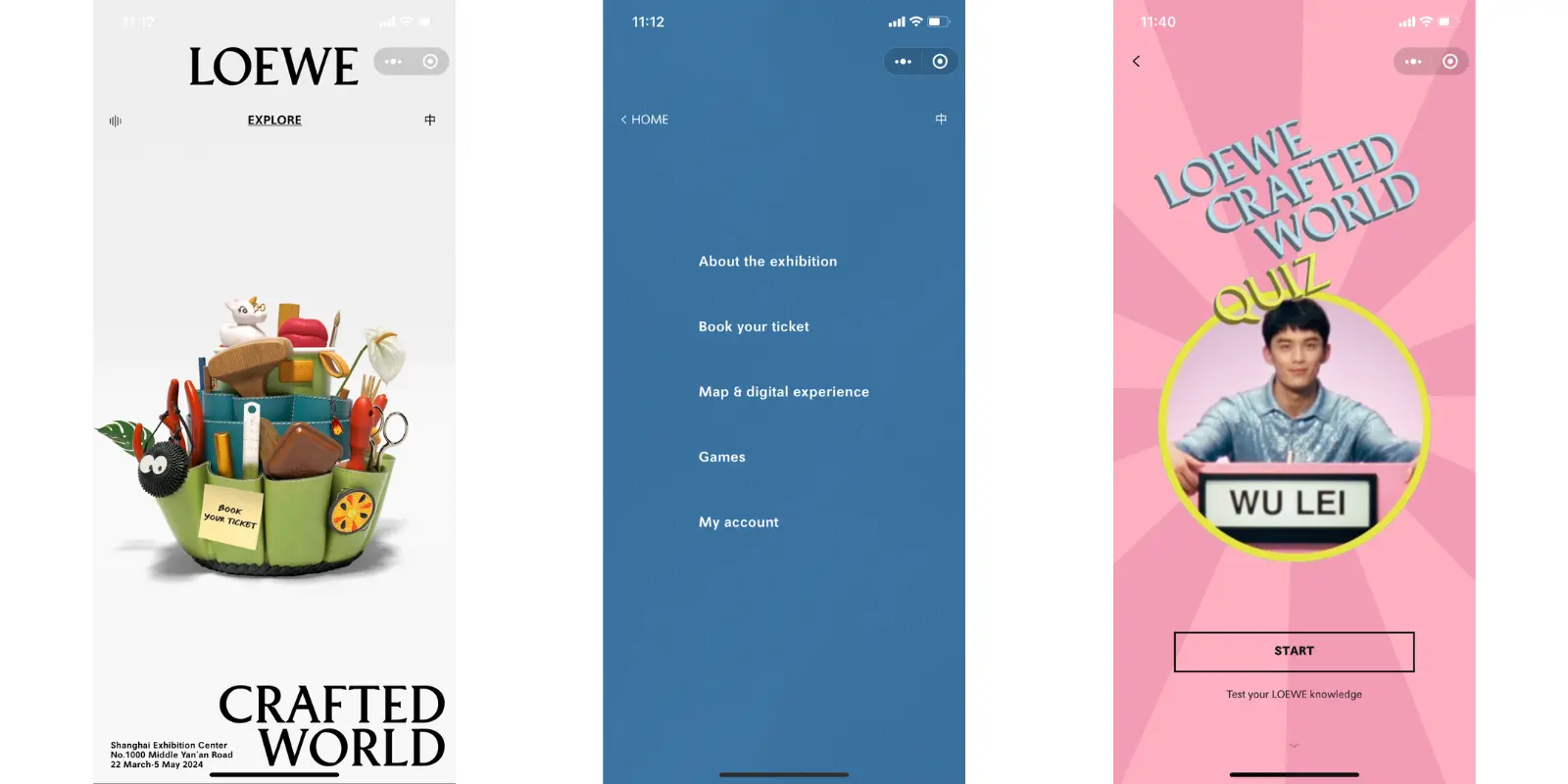
LOEWE offline exhibition companion WeChat mini program
Another example of an impressive use case is the "Cumen" (粗门) hangout community mini program. This innovative platform enables users to find like-minded individuals and communities for various activities, ranging from sports and games to educational events, casual hangouts, KTV, and clubbing. Users can discover nearby activities based on their location and preferences, join event groups, access group chats, and even view real-time maps of ongoing activities in their vicinity.
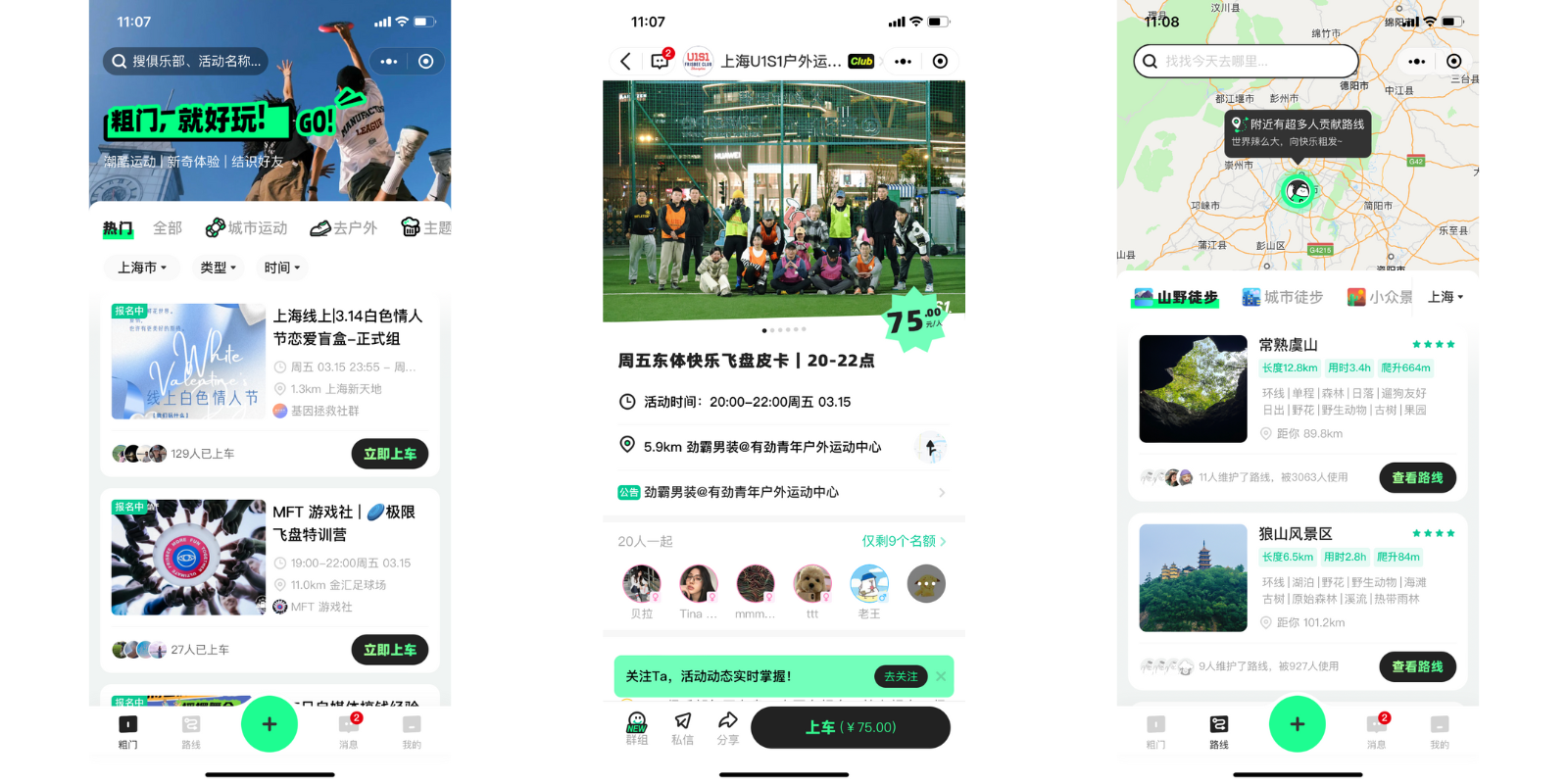
Cumen hangout WeChat mini program
WeChat's mini program ecosystem also extends to intelligent digital assistants, such as the Kimi AI Assistant (Kimi 智能助手). This AI-powered mini program allows users to ask questions, receive answers, and even upload documents for assistance, serving as a powerful search and productivity tool within the WeChat interface.
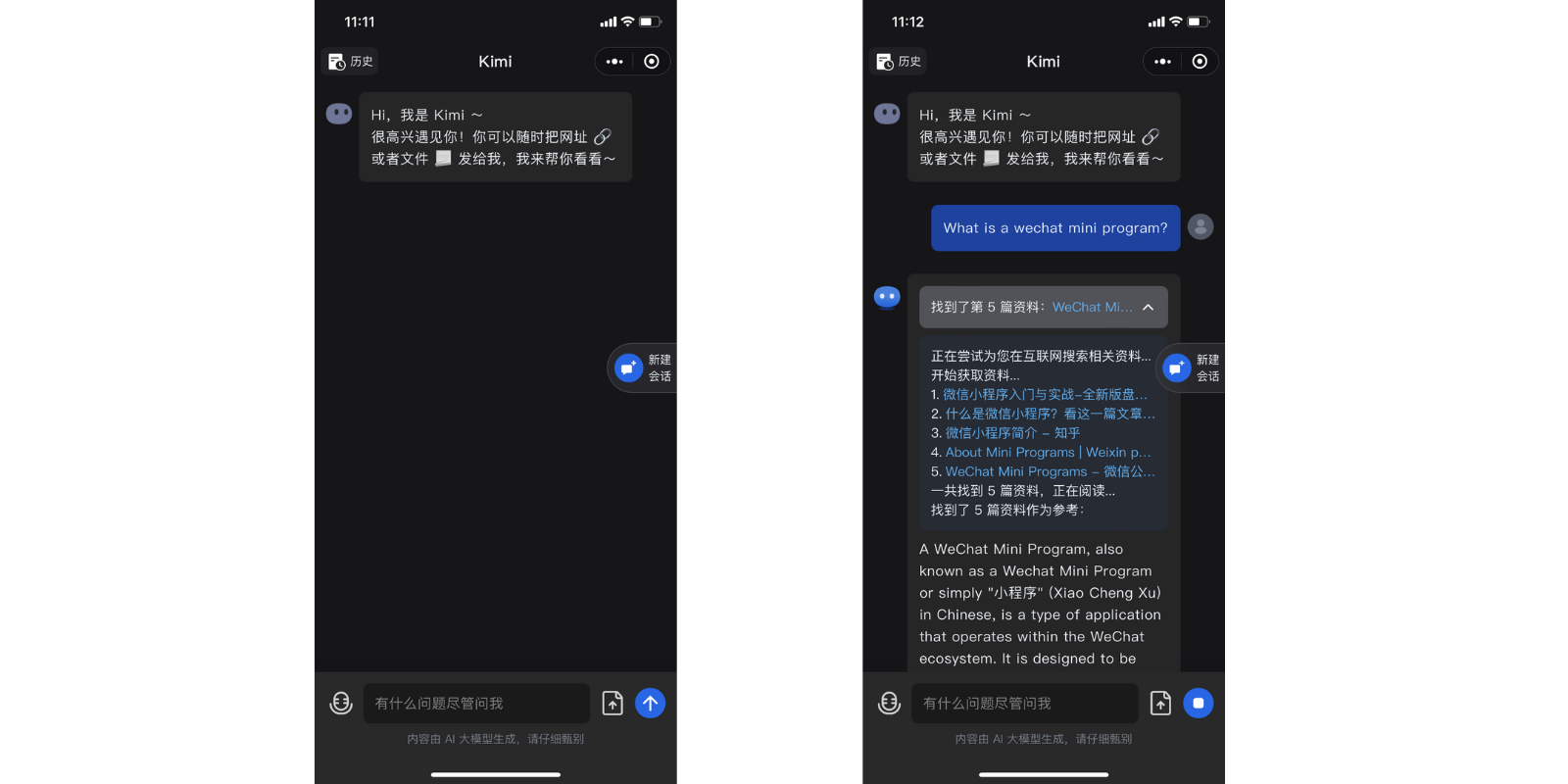
Kimi AI digital assistant WeChat mini program
In contrast, mini programs on platforms like Douyin (TikTok) and Xiaohongshu (RED) tend to focus more on e-commerce and transactional activities, such as product showcases, shopping experiences, and interactive marketing campaigns. While these platforms have strengths in the e-commerce realm, WeChat's mini program ecosystem stands out for its versatility. It caters to a broader range of use cases and seamlessly integrates them into users' daily lives.
By offering mini programs spanning various industries and sectors, WeChat has established itself as a comprehensive and indispensable platform deeply ingrained in its users' digital lives. As businesses continue to innovate and explore new possibilities, the WeChat mini program ecosystem remains a powerful canvas for enhancing customer experiences, streamlining processes, and driving engagement in ways that extend far beyond traditional e-commerce activities.
Alipay Mini Programs
Alipay, the popular mobile payment application owned by Alibaba Group, quickly followed WeChat's lead and introduced its mini-program ecosystem in 2017. Unlike WeChat, Alipay's mini-program ecosystem is exclusively open to corporate enterprises, setting a higher barrier of entry for developers.
Alipay's mini-programs are deeply integrated with the platform's core functionalities, particularly mobile payments. As a result, a significant portion of Alipay mini-programs revolve around financial services, business services, city services, and some e-commerce.
Businesses must undergo a verification process that depends on their industry and differs depending on the mini program category they are looking to launch.
Alipay's mini program interface offers convenience and a clean, intuitive layout. Users can personalize their home view, tailoring it to their unique preferences and needs. Whether you're seeking entertainment, productivity tools, or everyday essentials, Alipay's ecosystem provides many options with a polished and user-friendly interface that elevates your mobile experience.
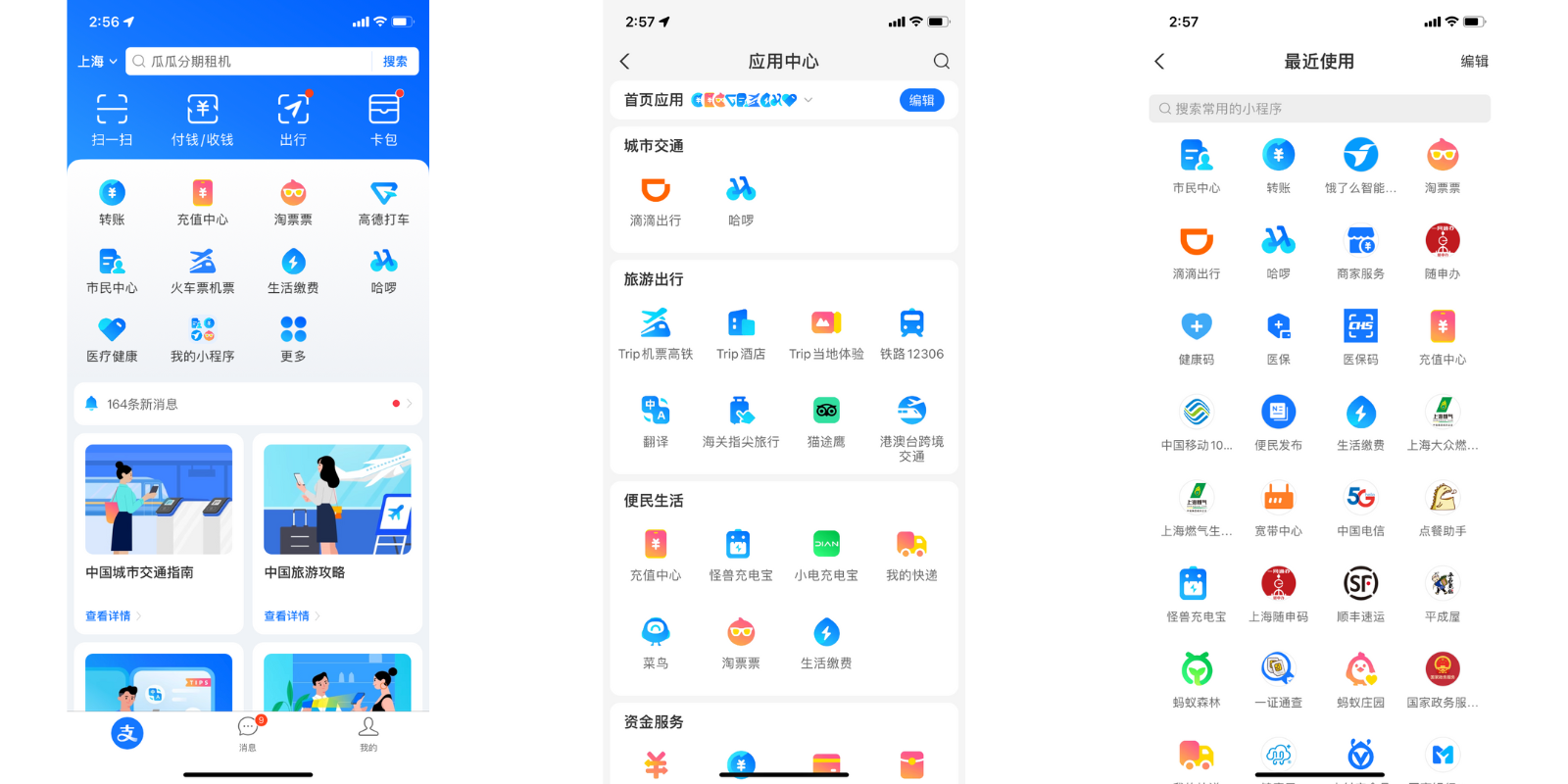
Alipay app home display and mini program center
Categorized Mini-Programs: Alipay organizes its mini-programs into intuitive categories such as "Pay/Receive," "Transport," "City Service," "Air & Rail," "Utilities," "Healthcare," and more. This categorization makes it easy for users to find and access the specific services they need without navigating through a cluttered interface.
"My Mini-Apps" Section: This dedicated section within the Alipay app allows users to access their frequently used or favored mini-programs in a single location. This feature enhances convenience by providing quick access to the mini-programs that users rely on the most, streamlining their daily activities and tasks.
Search Functionality: The search bar at the top of the interface enables users to quickly find and access specific mini-programs or services without browsing through different categories. This feature is handy when users know exactly what they're looking for, saving time and effort.
Integrating a wide range of services and functionalities within the Alipay app through mini-programs allows users to streamline various aspects of their daily lives, from commuting and paying bills to accessing healthcare and entertainment. Here are some popular categories one can see when opening Alipay app:
City Services and Transportation
Alipay's mini-programs seamlessly integrate various city services and transportation options. For example, users can access mini-programs related to public transportation, such as metro or bus services, and pay for their fares directly through Alipay's integrated payment system. This convenience eliminates the need to carry physical tickets or cash, making commuting more efficient.
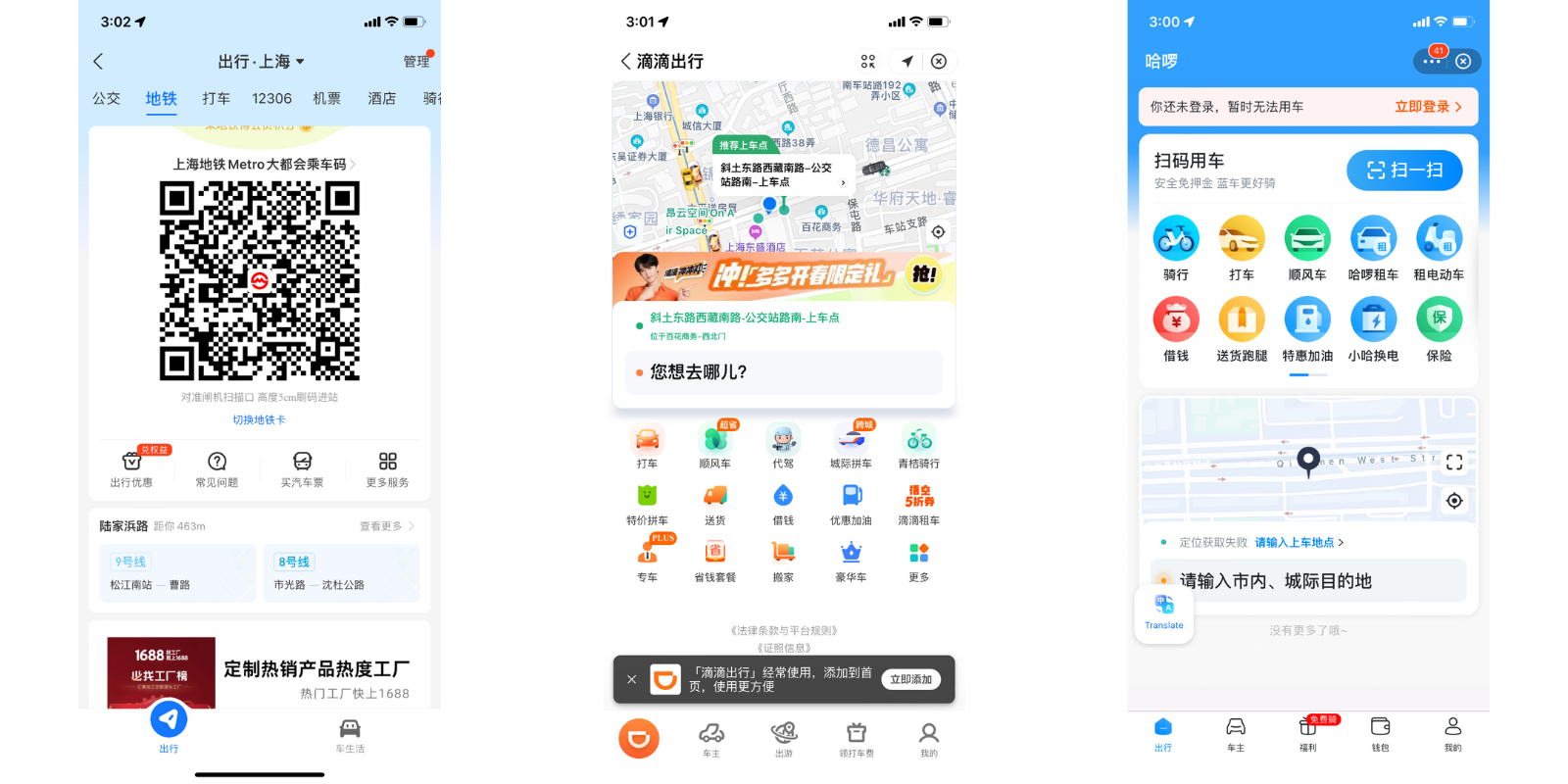
Shanghai metro | Didi car service | Hello shared bike
Utilities and Household Services
Alipay provides mini-programs that allow users to pay household utilities like electricity, gas, and water bills directly through the app. Additionally, the mini-programs offer automation features, enabling users to set up recurring payments or reminders for utility bills, streamlining the process, and eliminating the risk of missed payments.
Healthcare and Wellness
Alipay's healthcare mini-programs offer users a convenient way to access medical services, book appointments, and manage their healthcare needs. These mini-programs can provide information on nearby clinics, doctors, and medical facilities and enable online consultations or virtual booking services.
DouYin Mini Programs
Douyin, the Chinese version of TikTok, entered the mini-program arena in 2018, making it a relatively new player. As of 2024, Douyin has over 750 million daily active users and is one of the most influential apps in the country, offering a promising avenue for businesses to tap into a massive audience through mini-programs.
Compared to its international counterpart, TikTok, DouYin boasts more advanced features and functionalities, particularly in e-commerce and online shopping capabilities. DouYin Mini Programs are sub-applications integrated within the DouYin ecosystem, enabling users to access diverse services or shop for featured products seamlessly without leaving the app. This integration of Mini Programs elevates DouYin beyond merely a social media platform to an all-in-one entertainment and shopping hub.
Accessing DouYin Mini Programs is intuitive and user-friendly. Users can navigate to Mini Programs through the app's sidebar menu, which provides easy access to various functionalities and services. One can also discover mini programs through search or posts and live streams on the platform, enhancing their visibility and accessibility.
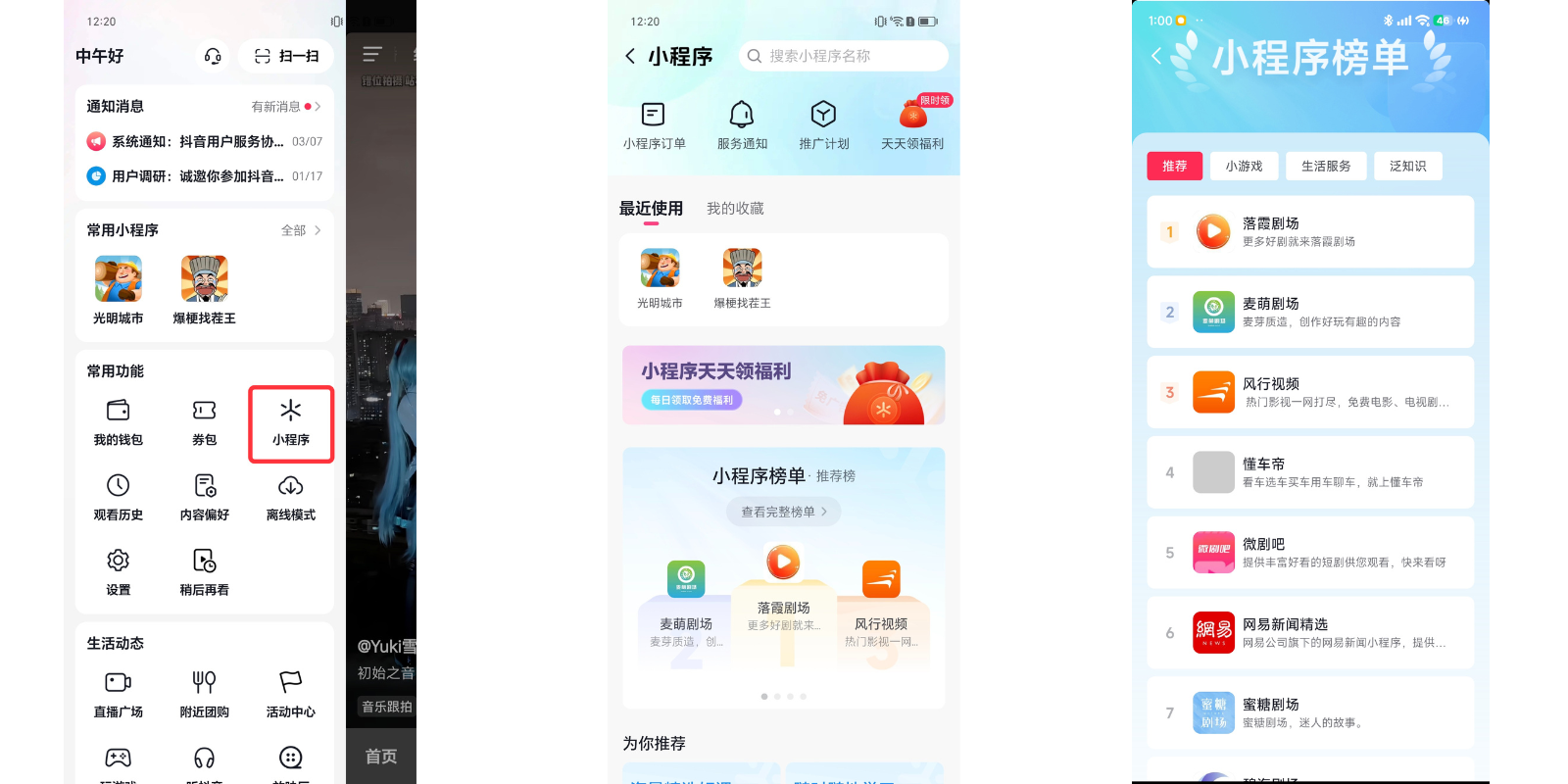
DouYin mini programs are accessible via the sidebar and top recommendations
Given DouYin's core focus on short-form video content and its integration of Mini Programs, businesses across various sectors can effectively leverage this platform—particularly those involved in e-commerce, entertainment, lifestyle, and consumer goods.
Fashion and Beauty Brands
A fashion or beauty brand could use DouYin Mini Programs to offer virtual try-on experiences. This would allow users to try on makeup, accessories, or clothing using augmented reality (AR) technology. This immersive experience would enhance user engagement and confidence in purchasing products online.
E-commerce Platforms
E-commerce platforms can leverage DouYin Mini Programs to create seamless shopping experiences directly within the app. They can showcase featured products, offer exclusive discounts, and facilitate quick and secure transactions, enhancing user convenience and driving sales.
Entertainment Industry
Movie theaters and entertainment companies can utilize DouYin Mini Programs to sell tickets for upcoming movies, concerts, or live events. Users can browse movie listings, view trailers, and purchase tickets without leaving the app, making ticket-buying more streamlined and convenient.
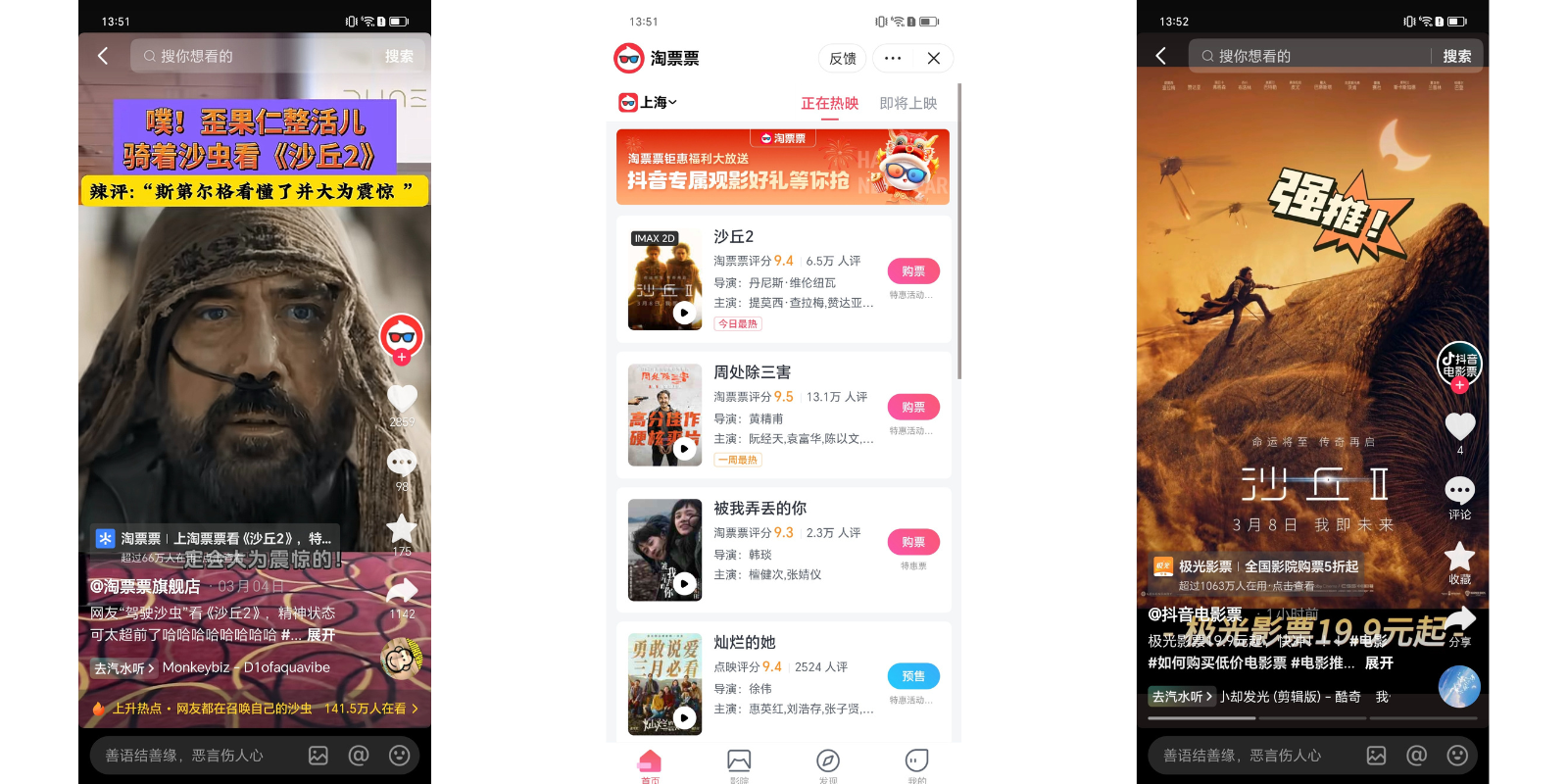
Movie clip leading to ticketing service mini program
Food and Beverage Businesses
Restaurants and food delivery services can benefit from DouYin Mini Programs by offering menu browsing, online ordering, and delivery tracking functionalities. Users can explore restaurant menus, place orders, and track delivery status directly within the DouYin app, simplifying the food ordering process.
Travel and Tourism Industry
Travel agencies can leverage DouYin Mini Programs to offer travel booking services, itinerary planning, and destination recommendations. Users can explore travel packages, book flights and accommodations, and access travel guides, making trip planning more convenient and hassle-free.
Education and Learning Platforms
Educational institutions and online learning platforms can utilize DouYin Mini Programs to provide interactive learning experiences, course enrollment, and educational resources. Users can access video lectures, participate in quizzes, and interact with instructors, enhancing their learning experience.
Baidu Mini Programs
Baidu, the leading search engine in China, introduced its mini-program ecosystem in 2018, aiming to provide businesses with greater visibility and functionality on its mobile platform. Unlike WeChat, Baidu's mini-program ecosystem is primarily open to corporate enterprises, creating a higher barrier to entry. Businesses must register for a Baidu Smart Mini Program and provide the required information, such as their ICP (Internet Content Provider) and business licenses.
Baidu Smart Mini Programs comprises an ecosystem of mobile apps that allow brands to enhance their presence on Baidu's mobile search engine results page (SERP). These apps include features such as service listings, keyword recommendations, resource libraries, and advanced display options.
One notable advantage of Baidu Smart Mini Programs is their direct integration into the Baidu app search. When users encounter Smart Mini Program results, they can launch official brand apps directly within the Baidu app, shortening the journey and improving conversions by reducing bounce rates.
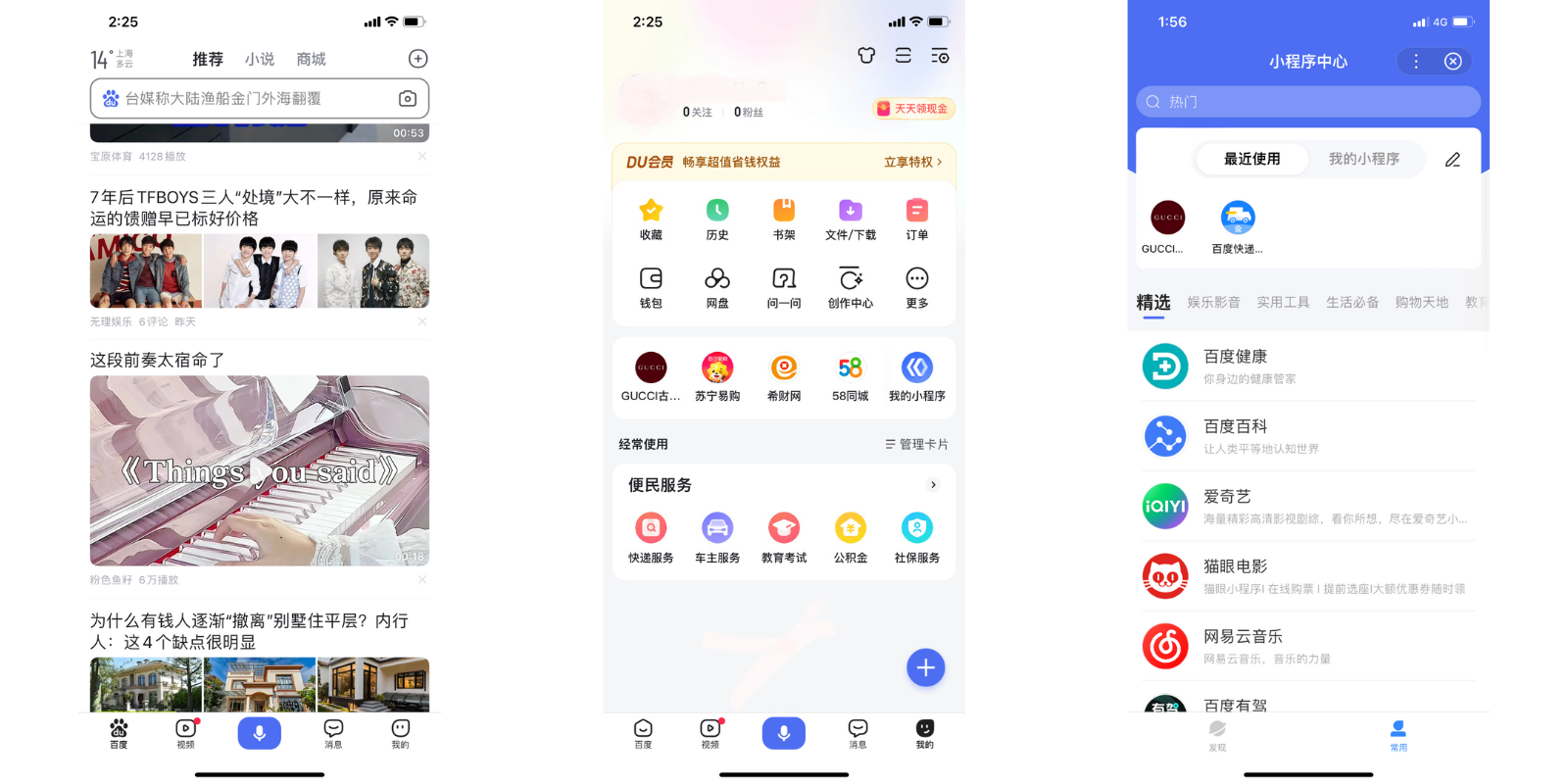
Baidu mini programs direct access path from “home screen” to “Mini program center”
From an SEO perspective, Baidu's Smart Mini Programs are attractive because Baidu prioritizes its app exposure and makes it easily searchable in branded and generic terms.
Baidu has a grading system for its mini programs, rating them based on quality points, performance stability, and violations. The levels are divided into three categories: A, B, and C, with A being the highest level, indicating excellent quality and user satisfaction.
The following factors determine the level composition:
Quality points: Baidu evaluates the overall quality of the mini program, considering factors such as user experience, functionality, and adherence to platform guidelines.
Performance stability: The mini program's performance, stability, and reliability are assessed to ensure a smooth user experience.
Platform violations: Baidu's policies or guidelines violations may negatively impact the mini program's level.
The higher the level, the better the quality of the mini program, and the more rights and benefits it receives, such as increased visibility and access to advanced features.
Key features and benefits available to higher-level Smart Mini Programs include:
Keyword-related recommendations
When users search for the brand name on the Baidu app, the Smart Mini Program appears as a suggested search, allowing users to jump directly to it.
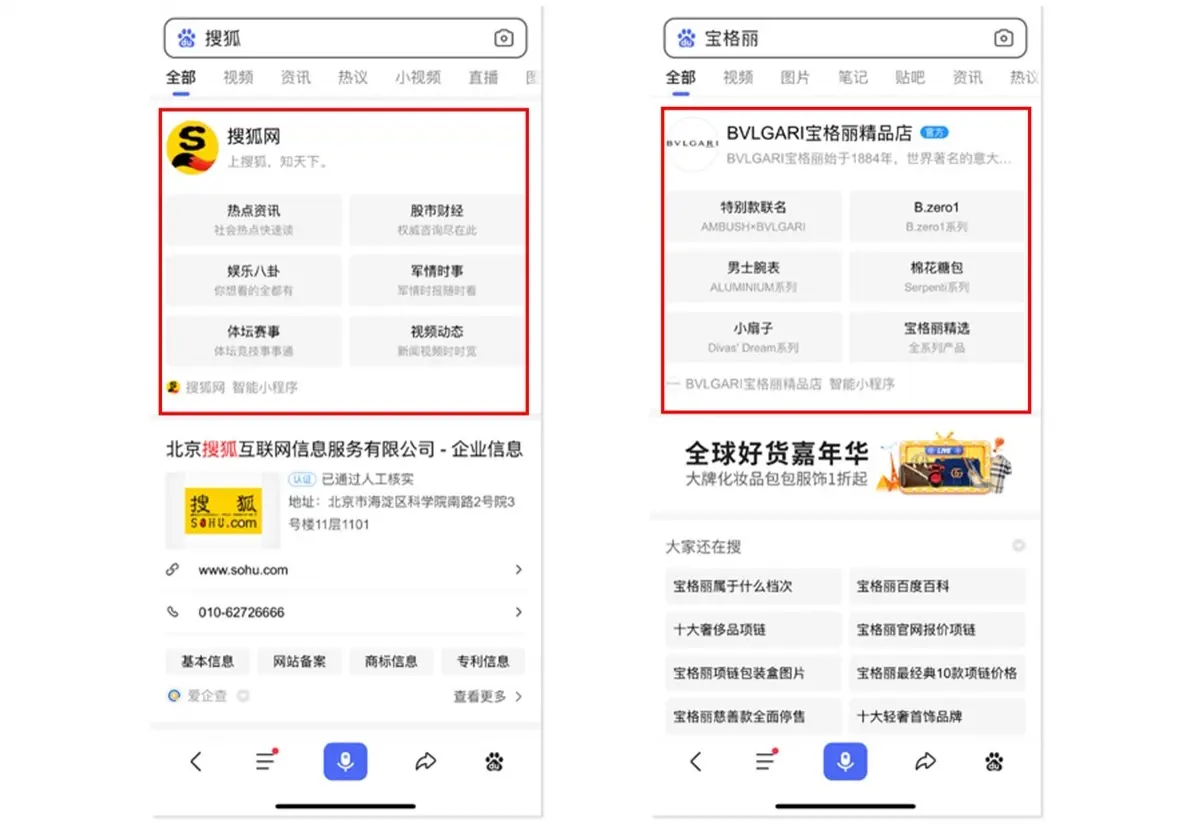
Branded search for Sohu and BVLGARI display mini programs as a top result
Q&A card display options
Brands can provide high-quality answers to industry-related questions, potentially ranking first on Baidu's SERP for those queries.
Brand trademark and keyword verification
Businesses can verify their Smart Mini Program results with an official blue tag, improving click-through rates (CTRs) for branded searches.
Core page keywords
Brands can prioritize important pages and assign branded and generic keywords to optimize their Smart Mini Program's title and description.
Advanced display cards
Businesses can manually set and optimize sitelinks, titles, and meta descriptions for their Smart Mini Program, enhancing visibility for branded and related searches.
Service listings display card
Service providers can list their services, categories, locations, and contact information, optimizing discoverability for relevant searches.
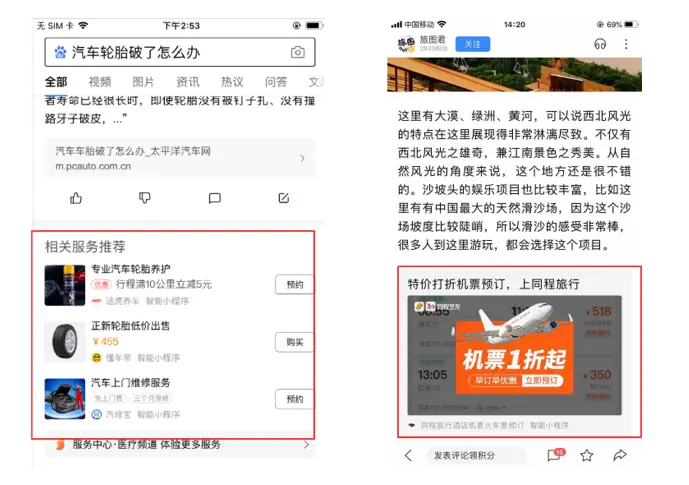
Mini program service listings display cards
Baidu's mobile ecosystem heavily favors Smart Mini Programs. It provides numerous optimization options to maximize exposure, making it an attractive platform for businesses seeking to boost their online presence and traffic in China.
Industries that could benefit from launching a Baidu Smart Mini Program include:
E-commerce and retail businesses: Optimize product listings, enable direct purchases, and enhance discoverability through targeted keyword optimization and advanced display options.
Service providers (e.g., delivery, home services): List service offerings, locations, and contact information, improving visibility for local and service-related searches.
Educational institutions and online learning platforms: Provide educational resources, course information, and interactive learning experiences through dedicated mini-programs.
News and media outlets: Enhance content discoverability and user engagement by leveraging Baidu's search capabilities and Q&A features.
While Baidu's mini-program ecosystem shares similarities with platforms like WeChat, its integration with China's leading search engine and emphasis on search optimization through Smart Mini Programs sets it apart.
By catering primarily to corporate enterprises and providing advanced search-centric features, Baidu mini programs offer businesses a unique opportunity to amplify their online presence and reach potential customers through Baidu's extensive mobile user base.
Xiao Hong Shu (Little Red Book) Mini Programs
Xiaohongshu, also known as Little Red Book or RED, has grown to become China's foremost fashion and luxury shopping platform since its inception in 2014. While primarily a content-sharing site where users can post product photos, reviews, and tips, Xiaohongshu has evolved into a broader lifestyle community covering various topics such as beauty, fashion, travel, and fitness.
Xiaohongshu's unique blend of trusted user-generated content, word-of-mouth advertising, and online community-building sets it apart. The platform focuses heavily on building trust and reliability between users and consumers, rewarding users for posting suggestions and advice to their followers. By consistently sharing quality content, users can quickly attract a significant following and earn commissions by becoming influencers, aka Key Opinion Leaders (KOLs) and Key Opinion Consumers (KOCs).
With 90% of its users being middle- or upper-class women with higher disposable incomes, Xiaohongshu presents a lucrative market for global fashion and cosmetics brands. While brands can set up Official Accounts to post content and sell products, the real opportunity lies in collaborating with Chinese influencers—KOLs and KOCs—who have cultivated large, engaged followings that trust their honest reviews and recommendations.

RED homepage discover view and shopping features
In addition to its thriving user community, Xiaohongshu has also attracted a wide range of brands and businesses seeking to leverage the platform's unique blend of social media and e-commerce capabilities. By partnering with Key Opinion Leaders (KOLs) and KOCs, brands can tap into the platform's engaged user base and benefit from the influential power of authentic product reviews and recommendations.
With its rapidly growing user base, predominantly comprising urban, affluent, and fashion-conscious Chinese consumers, Xiaohongshu has become a prime destination for global brands looking to connect with this valuable demographic.
Recognizing the potential, Xiaohongshu is rolling out its mini program ecosystem. This ecosystem will allow users to seamlessly access and engage with various services and functionalities directly within the app. The mini programs will add to the app's already existing official stores feature.
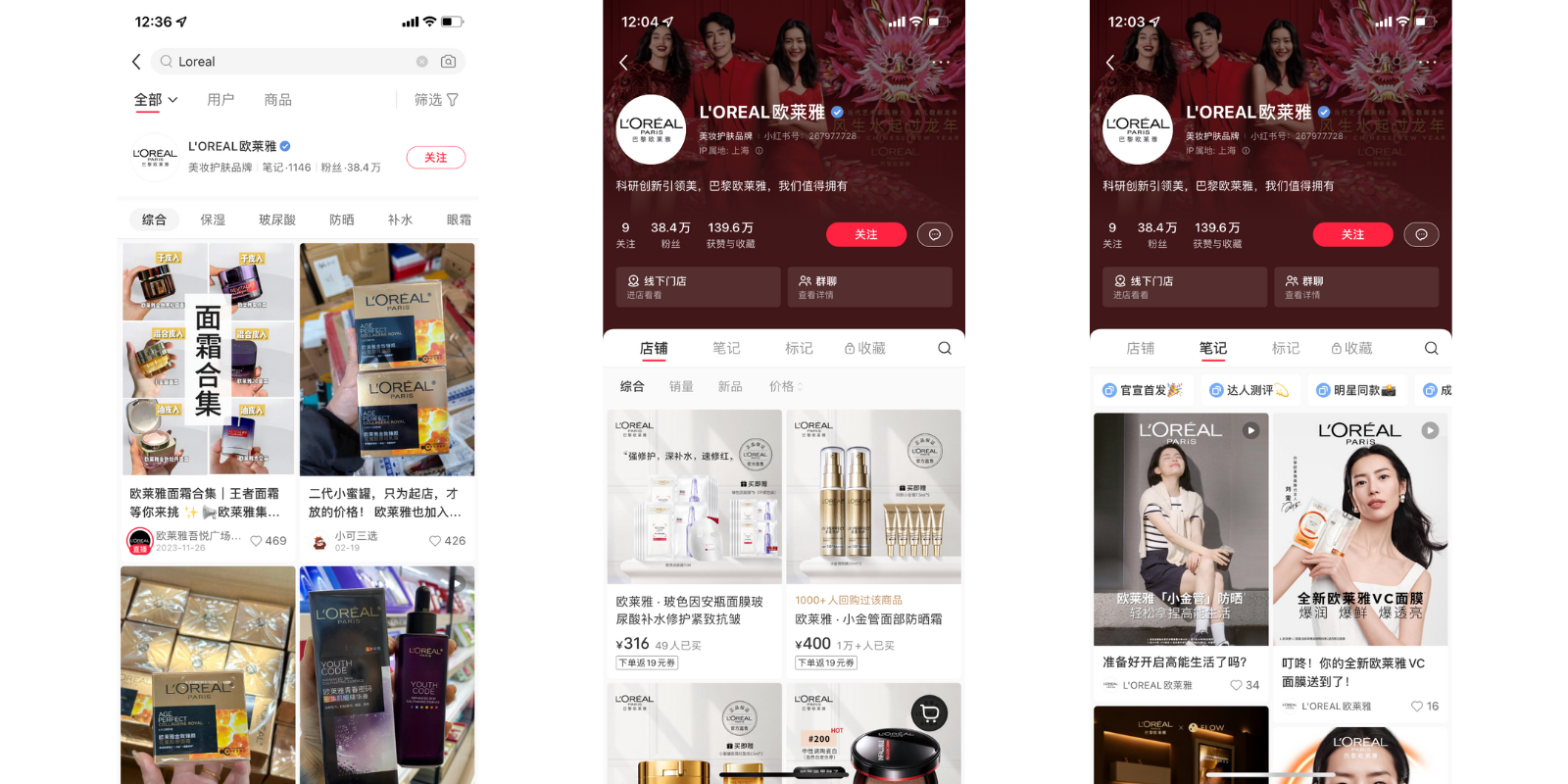
L’OREAL Xiao Hong Shu official account and store
Specific posts listed on Xiaohongshu's home page may be marked as "Advertisement," featuring a button redirecting users to relevant mini programs for purchasing the showcased products. This streamlined process facilitates seamless shopping experiences for users.
Xiaohongshu has recently started supporting direct jumping to WeChat as well, allowing users to access and interact with external mini programs from within the Xiaohongshu app.
Industries that could benefit from Xiaohongshu's mini program ecosystem include fashion, beauty, lifestyle, and consumer goods. Brands in these sectors can leverage Xiaohongshu's unique blend of user-generated content, influencer marketing, and e-commerce capabilities to reach and resonate with their target audiences effectively.
Taobao Mini Programs
Operated by e-commerce giant Alibaba, Taobao's mini-program ecosystem, introduced in 2018, offers businesses a direct line to millions of potential customers. These lightweight apps can be accessed through dedicated sections, search functions, and QR codes within the Taobao app, enabling streamlined shopping experiences, seamless transactions, and personalized features to foster loyalty.
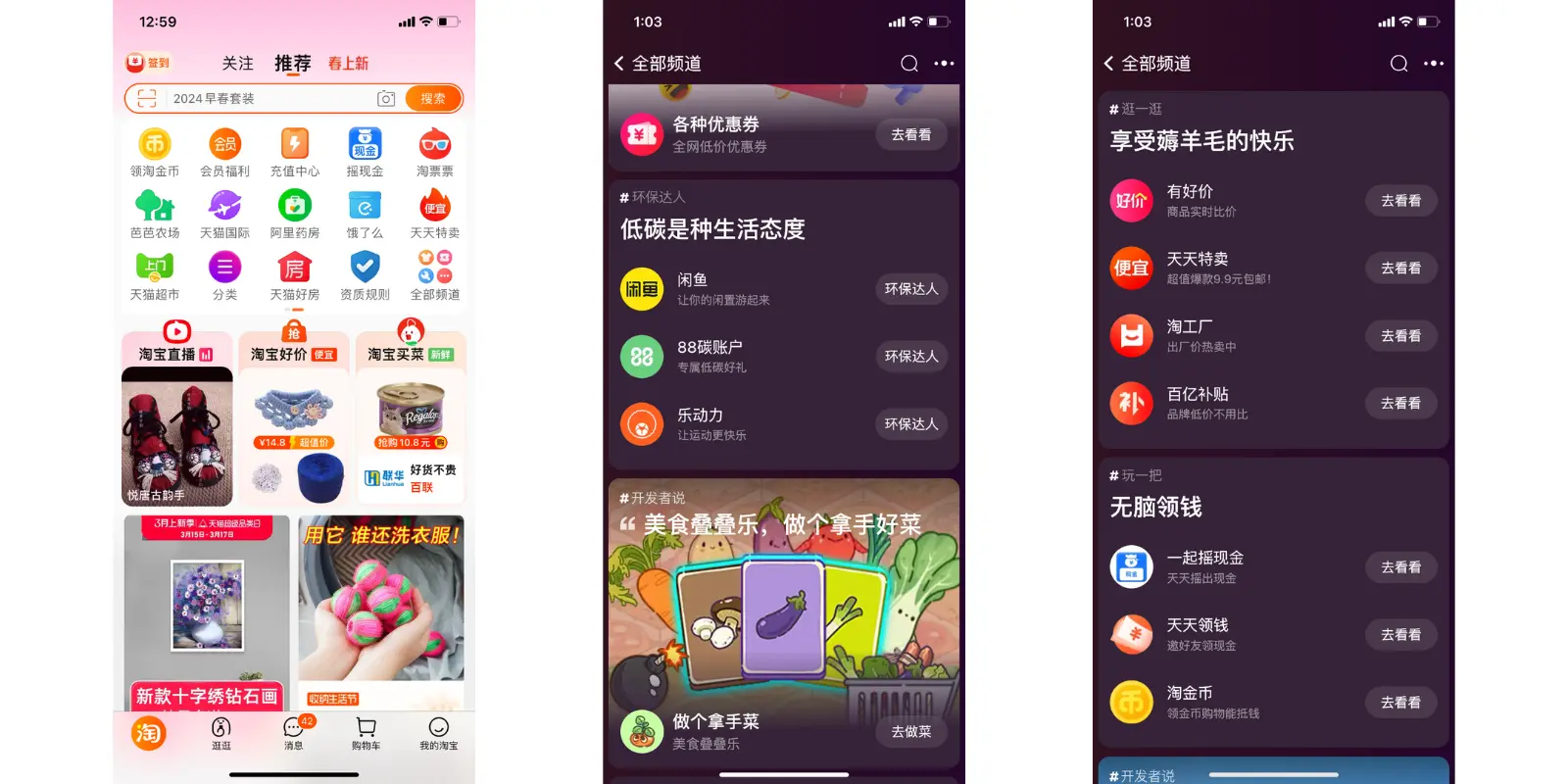
Taobao mini program ecosystem
Businesses must undergo a verification process and meet Taobao's requirements to gain entry into this ecosystem. This ensures quality control and adherence to the platform's guidelines, providing users a reliable and secure shopping environment.
Real Estate and Housing (天猫好房):
The "Tian Mao Good House" mini-program is essentially a real estate service within Taobao. It allows users to search for new homes, second-hand homes, rental properties, and student housing. The interface showcases various listings with images, prices, and property details - it’s a convenient one-stop solution for people looking to buy, sell, or rent properties without leaving the Taobao app.
Entertainment and Media (淘票票):
"Tao Piao Piao" is a movie ticketing mini-program within Taobao. Users can browse upcoming movies, check showtimes, book tickets, and even purchase snacks/refreshments, all within the same interface. This integration streamlines the movie-going experience, allowing users to plan and buy everything they need for a trip to the cinema without juggling multiple apps.
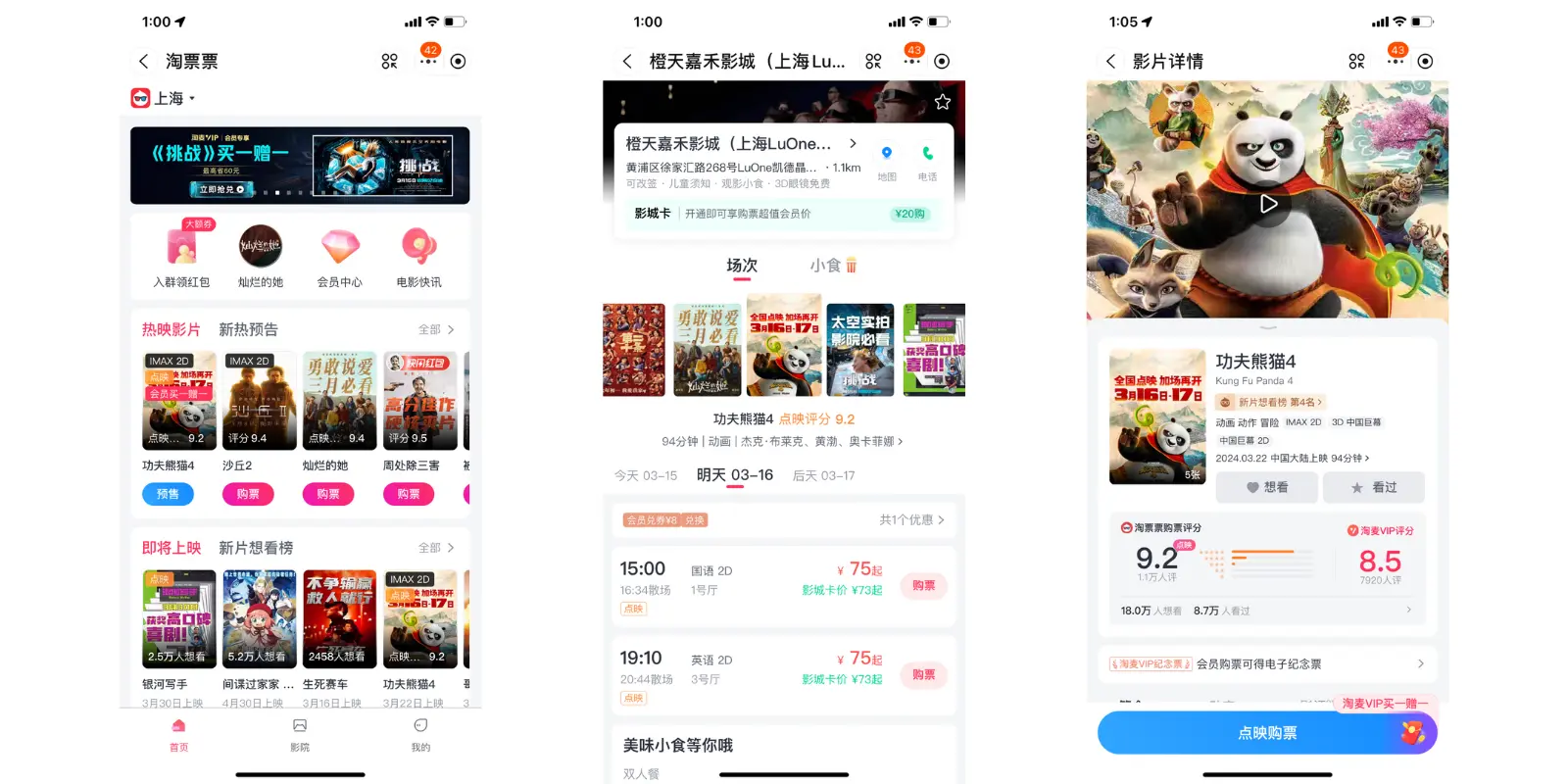
Tao Piao Piao mini program features
International Shopping (天猫国际):
"Tian Mao International" is a dedicated mini-program for cross-border e-commerce within Taobao. It lets users shop for international products and brands directly from overseas markets. This integration provides a convenient way for Chinese consumers to access global brands and products without the hassle of navigating different international e-commerce platforms.
Health and Wellness (阿里健康大药房):
The "Ali Health Pharmacy" mini-program is a virtual pharmacy within Taobao. Users can search for and purchase various medications, supplements, and health products. The pharmacy allows online consultations and can issue virtual prescriptions. The integration enables convenient access to essential healthcare items without visiting physical pharmacies or navigating separate health-focused platforms.
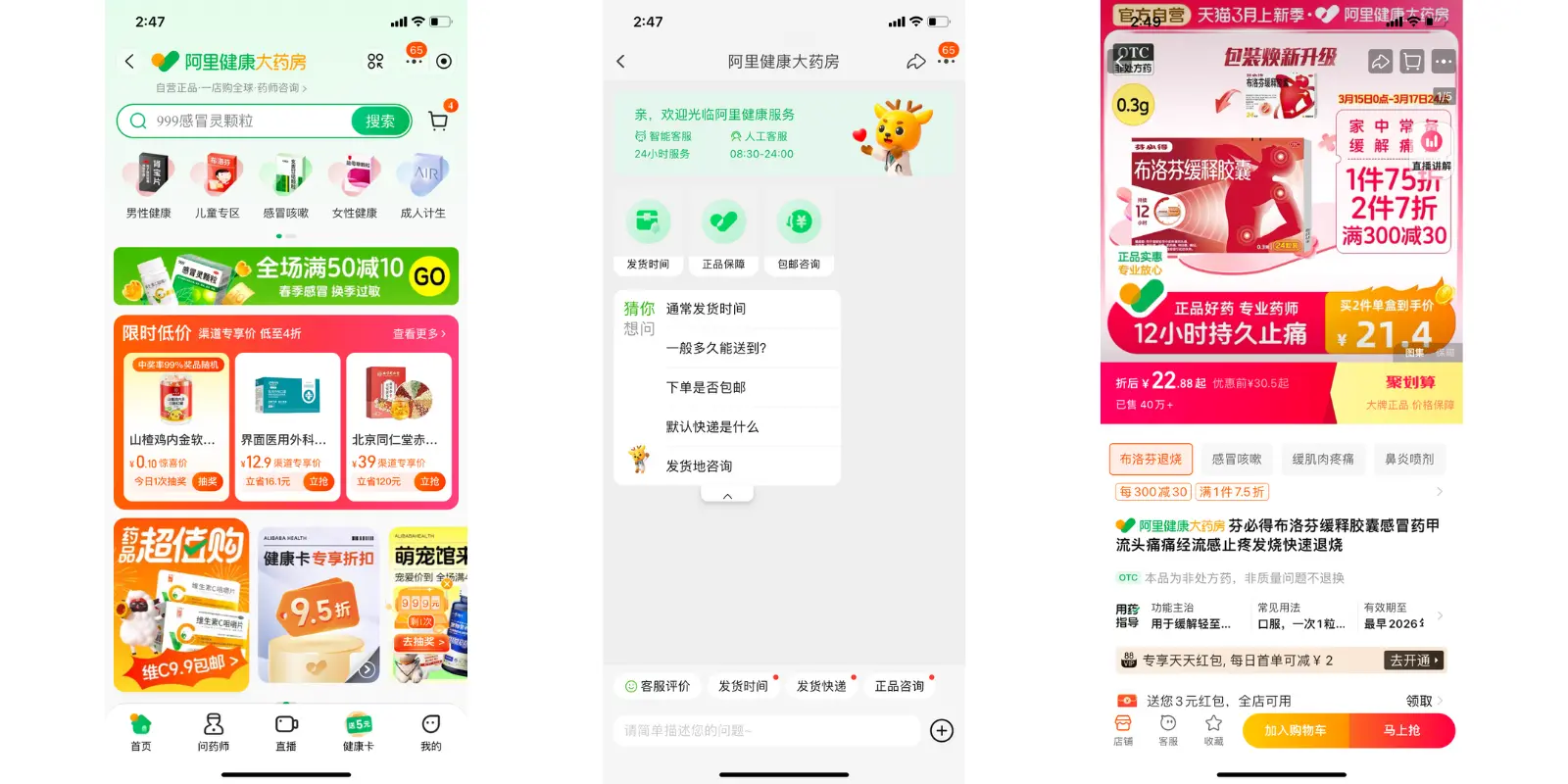
Ali Health Pharmacy mini program features
Balance Top-up and Utilities (充值中心):
The "Recharge Center" mini-program is a utility service that allows users to top up their mobile phone balances, pay utility bills, and manage recurring payments. This integration makes it convenient for users to handle essential tasks without leaving the familiar Taobao interface.
These are just a few examples of the diverse functionalities and services integrated into the Taobao ecosystem through mini-programs. The convenience lies in the seamless integration within the Taobao app, which users are familiar with and frequently use for e-commerce activities. By consolidating various services and functionalities into one platform, Taobao provides a comprehensive and cohesive user experience, streamlining daily tasks and activities for its users.
General Pros and Cons of Mini Programs
Mini programs offer a range of benefits for users, businesses, and super app platforms while presenting certain limitations and drawbacks. Understanding these advantages and disadvantages is crucial for companies considering the development of mini programs.
Advantages for Users:
-
Convenience: Users can access various services and functionalities without downloading and installing separate native apps decluttering their devices.
-
Seamless Integration: Mini programs operate within the familiar interface of the super app, providing a cohesive and integrated user experience.
-
No Registration Required: Users can access mini programs without going through separate registration processes, as they are already logged into the super app.
-
Lightweight and Storage-efficient: With size limitations ranging from 8MB to 20MB, mini programs consume minimal storage space on users' devices.
Advantages for Businesses:
-
Access to Existing User Base: By developing mini programs within popular super app ecosystems, businesses gain access to a vast pre-existing user base, eliminating the initial friction of user acquisition.
-
Streamlined User Experience: Mini programs allow businesses to offer a seamless user experience by integrating various functionalities, such as browsing, purchasing, and customer support, within a single interface.
-
Targeted Marketing and Sales: Social media-based super apps like WeChat and Douyin enable businesses to leverage integrated marketing and e-commerce capabilities within their mini programs.
-
Data Collection and Analytics: Super apps can provide businesses with valuable user data and analytics, facilitating a better understanding of customer behavior and preferences.
Disadvantages and Limitations:
-
Size Constraints: Due to their lightweight nature, mini programs have size limitations, restricting the extent of features and functionalities they can offer compared to native apps.
-
Platform Restrictions: Mini programs are subject to the rules and limitations imposed by the super app platforms, such as payment gateway restrictions or content moderation policies.
-
Limited Offline Functionality: Most mini programs require an internet connection to function properly, limiting their usefulness in areas with poor connectivity.
-
Dependence on Super Apps: The success and adoption of mini programs are closely tied to the popularity and user base of the hosting super app, creating a dependency on the platform's growth and sustainability.
While the advantages and disadvantages mentioned above apply to mini programs across various super app ecosystems, there are specific differences between WeChat's ecosystem and others. WeChat's dominant position and integration into daily life make its mini programs more versatile and suitable for a broader range of use cases beyond e-commerce.
In contrast, mini programs on platforms like Taobao, Douyin, and Alipay focus more on e-commerce and transactional activities, with some exceptions for specific niches or service-based businesses.
Is Developing Mini-Programs Beyond WeChat Worth It?
While the mini-program ecosystem thrives across various platforms in China, businesses must carefully evaluate their needs and target audience before venturing into developing mini-programs beyond the WeChat ecosystem. According to insights from industry experts, the application direction of mini-programs on platforms other than WeChat is relatively one-sided, with a significant focus on e-commerce.
For instance, if a brand aims to develop a mini-program on platforms like Taobao, Douyin, or Xiaohongshu, the primary objective is likely to be facilitating e-commerce activities, such as selling products, offering coupons, or engaging customers through gamified experiences. This is because, apart from e-commerce, no other platform has been able to integrate into people's daily lives as seamlessly as WeChat.
Developing a mini-program solely on ecosystems other than WeChat may not be a worthwhile investment for most businesses when it comes to local marketing and selling goods.
The reasoning behind this is twofold: firstly, e-commerce activities tend to be more transactional in nature, and building long-term brand loyalty or engagement through these platforms can be challenging. Secondly, while mini-programs on platforms like Taobao or Xiaohongshu may provide a good experience during the shopping process, users are less likely to continue actively following or engaging with the brand beyond their immediate purchase.
While the e-commerce focus is a common theme for mini-programs across platforms like Taobao, Douyin, and Xiaohongshu, developing mini-programs on these ecosystems could benefit specific niches and business models beyond selling products.
For instance, businesses offering recurring services or subscriptions, such as housekeeping, meal delivery, or home maintenance, could leverage mini-programs to streamline the customer experience and foster long-term engagement. By integrating with platforms like Alipay, these businesses could enable seamless subscription management, automated billing, and personalized service updates directly within the mini-program.
Businesses operating in industries that revolve around frequent transactions or bookings, such as transportation services (e.g., ride-hailing, bike-sharing), entertainment venues, or hospitality, could find value in developing mini-programs on these ecosystems. Mini-programs could facilitate convenient ticket purchases, reservations, and even loyalty program integration, enhancing the overall customer experience.
While the e-commerce focus remains prevalent, businesses should carefully evaluate their specific offerings and target audiences to determine if developing mini-programs on platforms like Alipay, Taobao, or others could provide a unique value proposition or enhance customer convenience and engagement beyond traditional e-commerce activities.
The mini program revolution in China has undoubtedly transformed how users interact with applications and services, offering unparalleled convenience and seamless integration within the familiar interfaces of super apps. From WeChat's versatile ecosystem to the specialized offerings of Alipay, Douyin, Baidu, Xiaohongshu (RED), Taobao, and others, businesses across various industries have many opportunities to explore and leverage the power of these integrated apps.
As the demand for enhanced user experiences and streamlined processes continues to grow, the importance of mini programs will only increase. Businesses that successfully navigate this dynamic landscape and embrace its potential will always stay ahead of the competition.
However, it's crucial to remember that developing and implementing mini programs require careful planning, strategic execution, and adherence to platform-specific guidelines and requirements. Partnering with an experienced and reputable digital product development agency is essential.
Digital Creative, a leading digital transformation and product development agency based in Shanghai, China, is a trusted partner for businesses seeking to leverage the power of mini programs. With a team of strategists, creatives, and tech experts, we specialize in designing and building mobile and web experiences that delight customers and drive business success.
As the mini program landscape evolves, businesses must remain agile and adaptable, continuously exploring new opportunities and staying ahead of emerging trends. By partnering with an agency like Digital Creative, companies can confidently navigate this dynamic landscape, using mini programs' full potential to drive growth, enhance customer experiences, digitalize and improve internal processes, and achieve lasting success in China.
Have a project in mind?
Join our newsletter!
Get valuable insights on the latest digital trends, strategies, and developments in China and globally delivered straight to your inbox.
